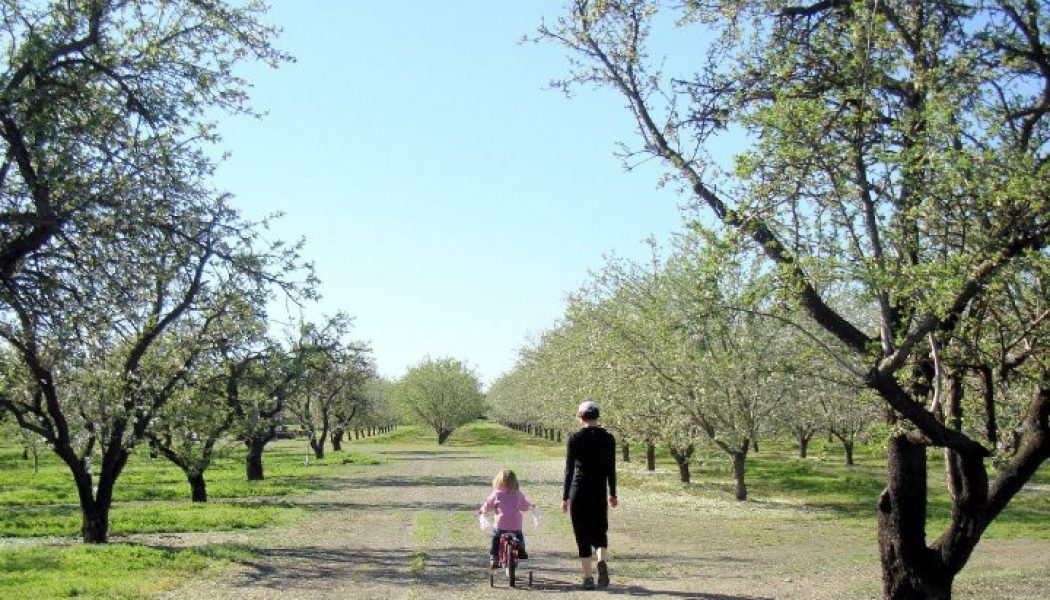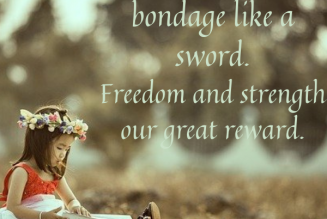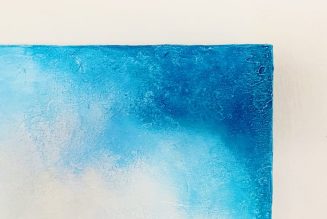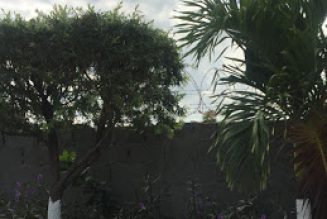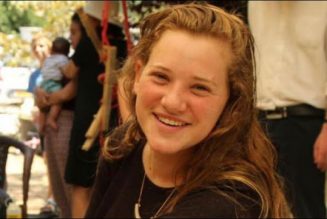There were trees uprooted next to the freeway. Mounds of dirt clod clumps clinging to thick roots sticking up, awkward, misplaced.
I wanted to get a better look at them, but I was driving on California Interstate 5 to Los Angeles. Husband and kids and bags and I journeying to friends who said, please come. It was overcast, gray sky low, arms stretching out in embrace.

If I was in the passenger seat, I’d have taken a photo. Or, I would have grabbed words and tried to work out what it was that was making my heart feel so tight in my chest when I looked out. Gnarled empty limbs, cement brown, so undignified, trunks sprawled, broken and exposed, on their sides.
I am familiar with almond trees–as a farmer’s daughter who watched her dad bend low, dirt crusted in lines of tanned skin, watching and listening to the voice of trees. I know the sharp edges of older bark as it breaks off in clumps, and the smooth, knotted roughness of young bark layered on new green. I know the smell of wet earth and the miracle of paper-thin nonpareil shells the dogs crack open and eat from the ground.
These trees were planted once. They were seeds once. They were shoots laid in dirt brown and hard, softened by drinks of water, aerated by steel spikes pulled by tractors, and visited by furry gray-brown squirrels and jackrabbits that scamper and scurry to limb upon limb or underground.
Hands planted each shoot into the ground. And the shoots grew and limbs stretched, quiet and strong, sprouting green leaves and white blossoms, and then nuts with green velvet shells before the hulls hardened and opened wide. Downy against thumb or cheek as you rub them close.
The day the bulldozers ripped roots straight out, one by one, row after row–violent, sure–was not a decision made quickly. It was not a decision that was easy. It was not a decision that was fun.
But it was necessary, whether due to lack of water, or money. Or maybe the orchard changed hands.
I hope new trees are planted soon. I hope these old trees, their roots so wrongly bent in weird angles outside the land where they belong, are replaced with new, young shoots. I pray their lineage continues, the life of the seeds giving birth to trees, with limbs pruned and the trees growing tall, before being pulled out of the ground.
Death didn’t look beautiful from this angle as I sped by, one of thousands of cars on a January Saturday afternoon. It didn’t look poetic or kind. It didn’t look hope-filled or cause for any celebration.
My hands clutched the steering wheel and I memorized the scene, the uprooted orchards, the story of men and of women and of dreams and of life coming so miraculously from hard ground.
I remembered my mom’s words to me on the phone the day before. The almonds will be in bloom soon. Just a few more weeks and the blossoms will be on the branches. The trees my father planted.
And yet I saw only uprooted trees, disaster, disorder, disappointment. And I knew the trees my father planted were scheduled to be pulled up soon, too.
The word for almond in Hebrew, is shakeid, the root of the word meaning to watch or to awake. Jeremiah, when he is asked by God what he sees, looks and says “I see an almond branch.” And I think about Jeremiah looking for what God wanted him to see, and how Jeremiah did see, and how what Jeremiah saw was something of so much beauty.
Father, show us what to watch for. Ask us what we see.
How will we answer? What is before us? What is in front of us? How do we see it? What is God asking us to see?
Jeremiah saw an almond branch, a branch of beauty, a branch also decorating the Lamp stand of the Tabernacle, in Exodus.
It was less than a minute and I had driven past the orchard. I was aware, as I looked, that it was a memory I wanted to keep. I knew that I would want to record it.
Aren’t we stirred, both, by beauty and beauty absent?
And in that moment I felt tears fall; I realized I was struggling to see beauty and hope when before me was disorder and chaos and death.
Let us watch with clear eyes, with open hearts. Let us remember there is always newness, always beauty, with God, even when things feel completely bleak.
And the word of the LORD came to me, saying, “Jeremiah, what do you see?” And I said, “I see an almond branch.” Then the LORD said to me, “You have seen well, for I am watching over my word to perform it (Jeremiah 1: 11-12).
Wherever we are, whatever we are doing, whatever situation we now face, I pray, sister, we ask for help in being watchful, in being observant, in desiring to see with clear, open eyes, what lies before us, yes–the miracle in the death, the life awaiting awakening, the word of God He is asking us to see, live out, believe.
For Loop Poetry Project, write a poem on an experience with change. Consider your present circumstances: what is different than what it was before? How can you bring to life your observations of these changes? Will you focus on the facts–the details of change that comes with time? Or will it be more of a rumination of the heart?

Some ideas to consider: how has your body changed, and how do you feel about that? What about your relationships? The environment? Your home? Your attitudes and/or opinions? Your interests and affinities? Your desires and questions about the world?
Share your poem below or on social media using the hashtag #looppoetryproject so we can find you. You can also share your poem in the private Facebook group, Loop Poetry Project, a supportive community of women pursuing heart wholeness through writing poetry. (Pursuing what is true, not perfection.)
love,
jennifer
To Be Taught
How is it that raindrops on windshields
and empty bleachers signal sadness,
memories of people in their youth
or old age congregating as if they
are known and understood,
inhabiting their moments fully
grounded in their feelings,
experiencing the living of smiling
and talking, crying and dancing,
without circumspection or analysis
or wistfulness or regret.
How can living be so easy
(breathing taken for granted)
an attitude undignified and wildly beautiful
in its freedom to be what it is
and not second-guess its meaning
or one’s role in it, a bold wild dance
of living loved and knowing it
so that each step is perfectly sure
and unparalleled in grace,
the way our eyes meet
and you teach me all these things
without saying a word.
This post appeared originally at jenniferjcamp.com
